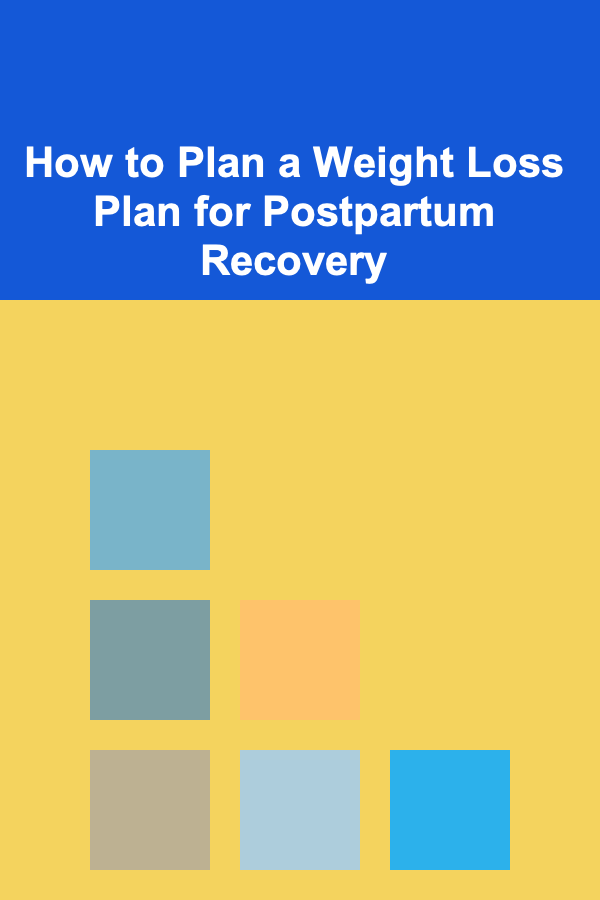
How to Plan a Weight Loss Plan for Postpartum Recovery
ebook include PDF & Audio bundle (Micro Guide)
$12.99$10.99
Limited Time Offer! Order within the next:

The postpartum period, often referred to as the "fourth trimester," is a time of immense change and adjustment for new mothers. Not only does the body need to heal and recover from childbirth, but many women also experience a desire to return to their pre-pregnancy weight. However, planning a weight loss plan during postpartum recovery requires a thoughtful, balanced approach to ensure that both physical health and emotional well-being are prioritized.
This article delves into how to plan an effective weight loss strategy during the postpartum period, considering the challenges of balancing nutrition, physical activity, and mental health. It's essential to understand that each woman's postpartum journey is unique, and a personalized, flexible approach is the best way to support long-term health.
Understanding Postpartum Recovery
The postpartum phase involves significant physiological changes. After childbirth, the body works to heal and return to its pre-pregnancy state, which includes the shrinking of the uterus, hormone level regulation, and physical recovery from childbirth, whether vaginal or via cesarean section.
During this recovery period, it's important to respect the body's need for rest and nourishment, especially if breastfeeding is involved. Hormonal changes, lack of sleep, and emotional fluctuations also add complexity to this stage. Hence, weight loss shouldn't be the primary focus immediately after giving birth; instead, the focus should be on holistic recovery and well-being.
Setting Realistic Expectations
It's vital to set realistic expectations for postpartum weight loss. Many women expect to lose weight quickly after childbirth, but the body's recovery process is gradual. In general, a healthy and sustainable weight loss rate is around 1-2 pounds per week. Rapid weight loss can interfere with breast milk production and may also be detrimental to a mother's overall health.
Common Pitfalls to Avoid:
- Extreme Dieting: Restricting calories too much can reduce energy levels, affect mood, and hinder breastfeeding.
- Comparing to Others: Everyone's postpartum recovery is different. Avoid comparing your journey to others' experiences.
- Unrealistic Timelines: Expecting rapid weight loss within the first few months can lead to frustration and disappointment.
Remember, it's about long-term health, not quick fixes. Establishing a sustainable routine will help with both weight management and overall wellness.
Prioritizing Nutrition for Postpartum Recovery
A healthy postpartum diet supports both weight loss and physical recovery. Nutrient-dense foods are essential to help restore energy levels, support breast milk production (for breastfeeding mothers), and aid in healing.
Key Nutrients for Postpartum Recovery
- Protein: Protein is essential for muscle recovery and rebuilding tissue, especially after childbirth. It also helps stabilize blood sugar levels and keeps you feeling full longer. Good sources include lean meats, fish, eggs, beans, and legumes.
- Iron: Childbirth often leads to blood loss, and postpartum women may experience anemia. Iron-rich foods, such as spinach, lentils, and red meat, can help replenish iron stores.
- Fiber: Postpartum women are more prone to constipation, especially if they've had a cesarean section. Fiber-rich foods, such as whole grains, vegetables, and fruits, can help improve digestion and support regular bowel movements.
- Healthy Fats: Healthy fats are crucial for hormone regulation and overall recovery. Sources include avocados, nuts, seeds, olive oil, and fatty fish like salmon.
- Calcium and Vitamin D: Bone health can be compromised during pregnancy and breastfeeding due to the depletion of calcium. Dairy products, leafy greens, and fortified foods provide essential calcium, while vitamin D can be obtained from sunlight and fortified foods.
- Hydration: Proper hydration is vital, especially for breastfeeding mothers, as milk production requires additional fluid intake. Water, herbal teas, and coconut water are great choices.
Tips for a Balanced Postpartum Diet
- Focus on Whole Foods: Incorporate whole grains, fruits, vegetables, lean proteins, and healthy fats into every meal.
- Avoid Processed Foods: Processed foods, often high in sugar, salt, and unhealthy fats, can impede weight loss and disrupt recovery.
- Meal Planning: Prepare meals in advance or consider meal delivery services to ensure you have nutritious options available when you're too tired to cook.
Mindful Eating
Mindful eating involves paying attention to hunger cues, eating slowly, and savoring each bite. This practice can prevent overeating and help you become more aware of what your body needs.
Incorporating Physical Activity Safely
Exercise is an essential part of postpartum weight loss, but it must be approached carefully. Returning to physical activity too soon or too intensely can delay recovery and potentially lead to injury. It's crucial to listen to your body and consult with a healthcare provider before starting any exercise regimen.
When to Start Exercising
- Vaginal Birth: If you had an uncomplicated vaginal birth, you might be able to engage in light physical activity within the first 6 weeks. Start with gentle exercises like walking or pelvic floor exercises.
- Cesarean Section: After a cesarean section, it's crucial to wait until your doctor clears you for exercise. This could take longer, usually around 8-10 weeks. Start with low-impact activities like walking or gentle stretching.
Key Types of Postpartum Exercise
- Pelvic Floor Exercises: The pelvic floor takes a lot of strain during pregnancy and childbirth. Exercises like Kegels can help strengthen the pelvic floor, reduce incontinence, and improve sexual health.
- Core Workouts: Gentle core exercises, such as pelvic tilts or modified crunches, help restore core strength after pregnancy. Avoid intense abdominal workouts until your core muscles are fully healed.
- Cardio: Once you're cleared to exercise, start with moderate-intensity cardio like walking, swimming, or cycling. These exercises help burn calories and improve cardiovascular health without putting too much strain on the body.
- Strength Training: Resistance training using light weights or bodyweight exercises can help build lean muscle mass and boost metabolism. Aim for full-body exercises that target major muscle groups.
- Postpartum Yoga and Pilates: These practices can improve flexibility, reduce stress, and promote overall well-being. Many postpartum yoga classes focus on strengthening the pelvic floor and core muscles.
Building an Exercise Routine
- Start Slowly: Begin with 10-15 minutes of low-impact exercise per day, gradually increasing the duration and intensity.
- Consistency is Key: Aim to exercise at least 3-4 times per week to see gradual improvements in your fitness level and weight loss.
- Listen to Your Body: If you experience pain, fatigue, or discomfort, take a break and reassess. Recovery is more important than pushing through pain.
The Role of Sleep and Mental Health in Postpartum Weight Loss
Getting enough sleep is one of the most challenging aspects of postpartum recovery, especially with a newborn. Sleep deprivation can lead to increased stress, poor decision-making, and emotional instability, all of which can affect your weight loss efforts.
Sleep
Sleep is crucial for hormone regulation, stress reduction, and overall health. Although it may be difficult to get enough rest with a newborn, try to find ways to prioritize sleep.
- Sleep When Baby Sleeps: Take naps when your baby naps, even if it's just for short periods.
- Delegate Tasks: If possible, ask for help from family members or hire a postpartum doula to give yourself a break and get some rest.
- Create a Sleep Schedule: Establish a consistent bedtime routine for both yourself and your baby to encourage better sleep.
Mental Health
Postpartum depression and anxiety are real concerns that many women face after childbirth. These conditions can interfere with your ability to maintain a healthy lifestyle and hinder weight loss efforts. It's important to address mental health concerns early and seek help if needed.
- Talk to a Professional: If you're feeling overwhelmed, anxious, or depressed, speak with a healthcare provider or therapist who specializes in postpartum care.
- Self-Care: Prioritize self-care activities that help you relax and recharge, whether that's taking a warm bath, reading, or engaging in hobbies you enjoy.
- Build a Support System: Surround yourself with friends and family who understand the challenges of postpartum recovery. Social support plays a significant role in mental health.
Setting Goals and Tracking Progress
Tracking your progress can be motivating, but it's essential to set realistic and flexible goals. Instead of focusing solely on the scale, track other health metrics like:
- Energy levels: Are you feeling more energetic after making dietary or exercise changes?
- Fitness improvements: Are you able to exercise for longer periods or increase intensity?
- Body measurements: Track waist, hip, and other body measurements, as they can show progress even when weight doesn't change significantly.
- Emotional well-being: Are you feeling better mentally and emotionally?
Celebrate Small Wins
It's essential to celebrate every step of progress, no matter how small. Weight loss is just one aspect of postpartum recovery. Celebrating the achievements of regaining strength, improving mental health, or achieving fitness milestones will help maintain motivation.
Conclusion
Planning a weight loss strategy for postpartum recovery is about much more than just shedding pounds---it's about healing, regaining strength, and nourishing the body while adjusting to the new responsibilities of motherhood. By focusing on a balanced diet, safe exercise, adequate rest, and mental health support, new mothers can set themselves up for long-term success and well-being.
Remember, every woman's postpartum journey is unique. It's important to listen to your body, set realistic goals, and allow time for recovery. By prioritizing health and self-care, postpartum weight loss can become a sustainable and empowering part of your recovery process.
Reading More From Our Other Websites
- [Soap Making Tip 101] Safety First: How to Select and Maintain Soap-Making Equipment Properly
- [Organization Tip 101] How to Create a Fun and Interactive Time Capsule Experience
- [Personal Financial Planning 101] How to Create a Will and Estate Plan for Your Family's Future
- [Polymer Clay Modeling Tip 101] Brittle or Soft? How to Diagnose and Fix Common Polymer Clay Texture Issues
- [Home Lighting 101] How to Use Smart Lighting to Save Energy and Enhance Security
- [Survival Kit 101] How to Assemble a High‑Tech Survival Kit for Drone Operators in Remote Locations
- [Biking 101] The Ultimate Guide to Cyclocross: Bike Setup, Training, and Tips
- [Personal Investment 101] How to Use Robo-Advisors for Hands-Off Investment Management
- [Home Budget 101] How to Master Budgeting for a New Job: Setting Yourself Up for Financial Success
- [Personal Finance Management 101] How to Simplify Debt Consolidation and Improve Your Financial Health

10 Ways to Earn Passive Income with Deep Learning
Read More
How to Use DIY Projects to Craft Unique Holiday Decorations for Your Home
Read More
How to Understand Central Bank Digital Currencies (CBDCs) on Blockchain
Read More
How To Dress for Success (Even When Working Remotely)
Read More
How to Track Medical Expenses for Freelancers and Self-Employed Individuals
Read More
10 Tips for Using Daily Affirmations to Manifest Your Dream Career
Read MoreOther Products

10 Ways to Earn Passive Income with Deep Learning
Read More
How to Use DIY Projects to Craft Unique Holiday Decorations for Your Home
Read More
How to Understand Central Bank Digital Currencies (CBDCs) on Blockchain
Read More
How To Dress for Success (Even When Working Remotely)
Read More
How to Track Medical Expenses for Freelancers and Self-Employed Individuals
Read More